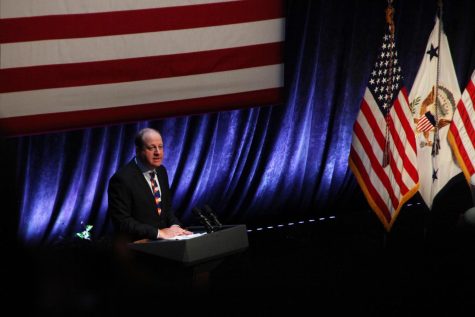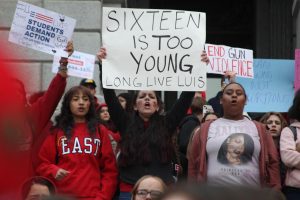Vice President Harris Visits Denver For Talk on Environmental Policy
Joined by Governor Jared Polis, Representative Brittany Pettersen, and rock climber Sasha DiGiulian, Harris touched on water policy and environmental equity
Vice President Kamala Harris visited Arvada on Monday to discuss the Biden Administration’s climate policies with U.S. Representative Brittany Pettersen and rock climber Sasha DiGiulian. “When you combine what we have accomplished with the Inflation Reduction Act, together with the CHIPS [and Science] Act and the bipartisan infrastructure law, we’re looking at about $1 trillion that will hit the streets of America,” Harris said. “And what an impact we can have, to really fast-forward what is long overdue on a number of issues…what we’ll do around greenhouse gas emissions, what we will do in our water policy.”
March 7, 2023
Vice President Kamala Harris spoke to a crowd of several hundred people in Arvada on Monday in a moderated conversation that focused on environmental policy and equity with rock climber Sasha DiGiulian and U.S. Representative Brittany Pettersen.
Harris described many of the Biden Administration’s policies surrounding water and clean energy, how the administration is attempting to adapt to a changing climate, and how it will affect future generations.
“We have grown up with a system that when there are floods, we have the state of mind to address the emergency at the moment,” Harris said, reminding the audience of previous policies that had exacerbated environmental problems and stating that it was increasingly vital that lawmakers think “about how we will build not only for this moment, but really critically evaluate what we have been doing to understand that some of it just hasn’t been very smart.”
It was the latest of stops on Harris’s tour around the U.S. to discuss the administration’s climate policy. The Build Back Better Plan, the Biden administration’s post-COVID relief package, included an entire subsection – the American Jobs Plan (AJP) – that largely focused on putting the U.S. “on course to meet its climate goals,” according to the White House website.
Recently, Harris has also visited Atlanta, Georgia, to participate in a similar conversation, and St. Cloud, Minnesota, to discuss clean energy and electric school buses. The plan allocates around $2.5 billion to upgrading buses, whose diesel fumes can pose health risks.
“25 million children a day go to school on a school bus. Over 90% of them are diesel-fueled,” Harris said in Arvada. “Which means not only are those children inhaling those fumes, the bus driver is inhaling those fumes, [and] whoever is in the educational ecosystem is inhaling those fumes.”
Harris connected the school bus issue to larger themes of environmental inequity, touching on how existing infrastructure such as lead pipes or waste dumping grounds near lower-income communities can perpetuate existing inequalities.
Primarily, however, Harris discussed water. Harris previously unveiled the White House’s plan to attack global water insecurity in June. The plan, which she detailed on Monday as well, acknowledges that water security is directly linked to national security and establishes the U.S. as a leader in maintaining water security around the globe, monitoring how water connects and divides regions.
“Take, for example, the Colorado River; take, for example, Lake Mead; all of these water sources, what’s happening in California and how that affects Colorado,” Harris said. “We are so interconnected and interdependent. And to the extent that we fully embrace that point, I think we will be smarter with policy and resources and understand the importance of collaboration.”

Harris’s climate optimism and knowledge resonated with fellow speakers and audience members alike. Pettersen referred to her as “a woman who’s inspired so many of us.” And in his introductory speech, Governor Jared Polis “applaud[ed] the leadership of the Vice President” in fighting the climate crisis, something he said Colorado has been at the forefront of doing.
The audience was made up of local environmental leaders, educators, and politicians. Many of the organizations invited have supported the Biden Administration’s bold climate policy in the past. Brian Jackson, a senior manager of Western water for the Environmental Defense Fund, called it “a celebration.”
Jackson had his son, 8-year-old Brooks Jackson, with him. Much of what Harris said, from her discussion of electric school buses to her acknowledgement of young people as the center of the “innovation around the clean energy economy,” resonated with Jackson as a parent.
“I really like what she said that we’re solving the problem, but we’re [also] creating the future,” Jackson said. “I’m excited about the prospect that one day, Brooks won’t know what it means to go get an oil change, because he’s gonna have an electric car.”
Brooks was not the only child in attendance. Many kids came with their parents in coordination with Moms Clean Air Force, a parent organization committed to reducing air pollution and climate change.
“Our children and today’s youth are counting on important decisions that are being made now that will impact our climate and their future, and these very youth will carry this work forward in the future,” Moms Clean Air Force Colorado Field Organizer Laurie Anderson said via email. “It is equally important for our leaders to see the faces of today’s youth that will most certainly be impacted by their current and ongoing decisions.”
As for Harris’s talk, Brooks said he “loved it,” especially the parts about electric buses.
Anderson said that Harris’s optimism about the future encouraged her. “We currently face poor air quality in Colorado that impacts our children’s health, along with an existential threat to our climate,” Anderson said. “However, federal leadership is making major accomplishments on the issues of climate, including the infusion of such a substantial investment that will exponentially grow the impact.”
Among other invitees was Cherry Creek School Board Vice President Janice McDonald, who remarked on Harris’s focus on environmental equity and added that she agreed with Harris’s idea that young people are important in the conversation about the environment.
“Youth somewhat [are] a double edged sword,” McDonald said via email. “Young people are victims of the effects of the environmental conditions and yet they can also be the catalyst or change agents by using their forward thinking through education, science and technology. By witnessing the bad effects on society now they can change their behavior and attitudes.”
Spreading awareness and optimism about Biden’s climate action has been key in the administration’s push to promote progressive policies. Harris said she believes the steps the administration has taken are a sign that the climate crisis is not hopeless.
“We’re saving something, but we’re also going to be better,” she said. “We’re creating, we’re innovating. It’s exciting. It’s not only like, ‘hey, let’s get on the life raft, and everybody just pull it in,’ we’re actually creating new ways of doing things.”



![Vice President Kamala Harris visited Arvada on Monday to discuss the Biden Administration’s climate policies with U.S. Representative Brittany Pettersen and rock climber Sasha DiGiulian. “When you combine what we have accomplished with the Inflation Reduction Act, together with the CHIPS [and Science] Act and the bipartisan infrastructure law, we’re looking at about $1 trillion that will hit the streets of America,” Harris said. “And what an impact we can have, to really fast-forward what is long overdue on a number of issues…what we’ll do around greenhouse gas emissions, what we will do in our water policy.”](https://unionstreetjournal.com/wp-content/uploads/2023/03/IMG_7227-900x600.jpg)




















